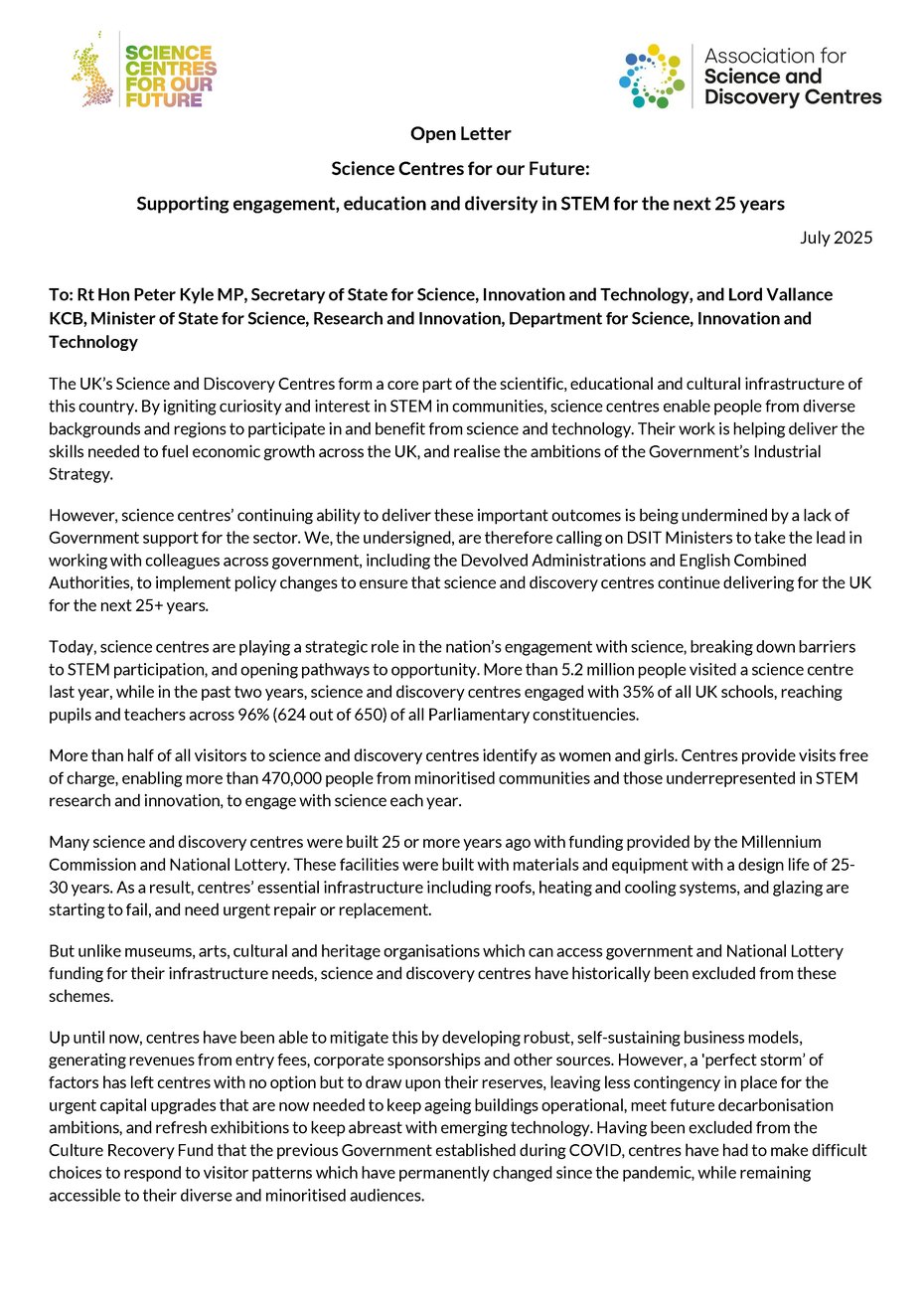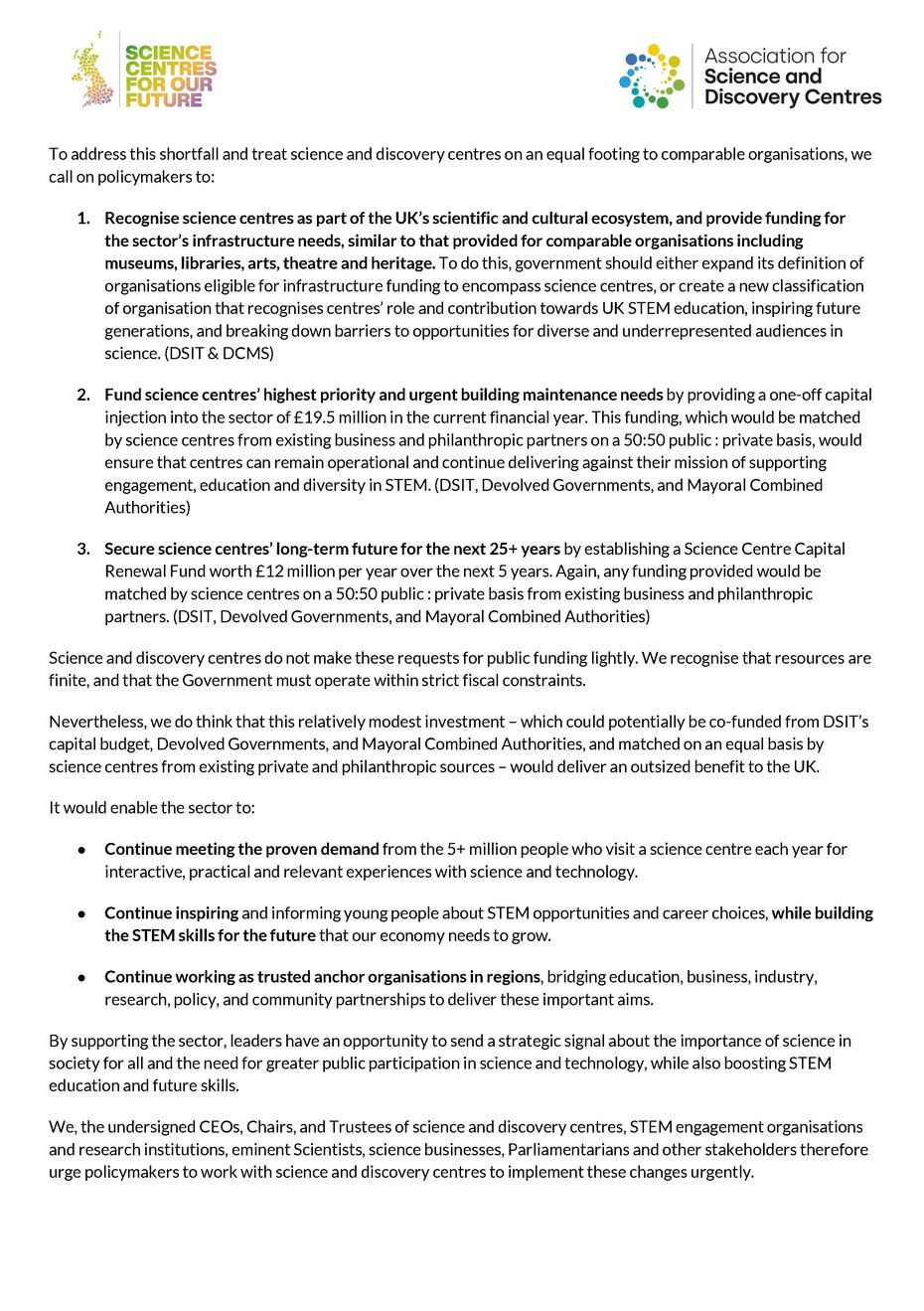Science Centres for Our Future Open Letter 2025

The UK’s Science and Discovery Centres form a core part of the scientific, educational and cultural infrastructure of this country, making science open, accessible and aspirational for everyone. They ignite curiosity and nurture a long-lasting interest and identity in science, technology, engineering and maths (STEM).
These organisations are driven by the principle that access to science is a fundamental right, and that broadening participation from diverse regions and backgrounds, is good for UK society and for science itself. Their work is helping to deliver the skills needed to fuel economic growth across the UK, and realise the ambitions of the Government’s Industrial Strategy.
However, science centres’ continuing ability to deliver these important outcomes is being undermined by a lack of Government support for the sector.
This open letter calls on Ministers from the Department for Science, Innovation and Technology (DSIT) to take the lead in working with colleagues across government to implement policy changes that protect the future and realise the full potential of science and discovery centres for the UK.
The open letter:
Science Centres for Our Future: Supporting engagement, education and diversity in STEM for the next 25 years
July 2025
To: The Rt Hon Sir Keir Starmer KCB KC MP, Prime Minister, Rt Hon Liz Kendall MP, Secretary of State for Science, Innovation and Technology, and Lord Vallance KCB, Minister of State for Science, Research and Innovation, Department for Science, Innovation and Technology
The UK’s 28 Science and Discovery Centres form a core part of the scientific, educational and cultural infrastructure of this country. By igniting curiosity and interest in STEM in communities, science centres enable people from diverse backgrounds and regions to participate in and benefit from science and technology. Their work is helping deliver the skills needed to fuel economic growth across the UK, and realise the ambitions of the Government’s Industrial Strategy.
However, science centres’ continuing ability to deliver these important outcomes is being undermined by a lack of Government support for the sector. We, the undersigned, are therefore calling on DSIT Ministers to take the lead in working with colleagues across government, including the Devolved Administrations and English Combined Authorities, to implement policy changes to ensure that science and discovery centres continue delivering for the UK for the next 25+ years.
Today, science centres are playing a strategic role in the nation’s engagement with science, breaking down barriers to STEM participation, and opening pathways to opportunity. More than 5.2 million people visited a science centre last year, while in the past two years, science and discovery centres engaged with 35% of all UK schools, reaching pupils and teachers across 96% (624 out of 650) of all Parliamentary constituencies.
More than half of all visitors to science and discovery centres identify as women and girls. Centres provide visits free of charge, enabling more than 470,000 people from minoritised communities and those underrepresented in STEM research and innovation, to engage with science each year.
Many science and discovery centres were built 25 or more years ago with funding provided by the Millennium Commission and National Lottery. These facilities were built with materials and equipment with a design life of 25-30 years. As a result, centres’ essential infrastructure including roofs, heating and cooling systems, and glazing are starting to fail, and need urgent repair or replacement.
But unlike museums, arts, cultural and heritage organisations which can access government and National Lottery funding for their infrastructure needs, science and discovery centres have historically been excluded from these schemes.
Up until now, centres have been able to mitigate this by developing robust, self-sustaining business models, generating revenues from entry fees, corporate sponsorships and other sources. However, a 'perfect storm’ of factors has left centres with no option but to draw upon their reserves, leaving less contingency in place for the urgent capital upgrades that are now needed to keep ageing buildings operational, meet future decarbonisation ambitions, and refresh exhibitions to keep abreast with emerging technology. Having been excluded from the Culture Recovery Fund that the previous Government established during COVID, centres have had to make difficult choices to respond to visitor patterns which have permanently changed since the pandemic, while remaining accessible to their diverse and minoritised audiences.
To address this shortfall and treat science and discovery centres on an equal footing to comparable organisations, we call on policymakers to:
- Recognise science centres as part of the UK’s scientific and cultural ecosystem, and provide funding for the sector’s infrastructure needs, similar to that provided for comparable organisations including museums, libraries, arts, theatre and heritage. To do this, government should either expand its definition of organisations eligible for infrastructure funding to encompass science centres, or create a new classification of organisation that recognises centres’ role and contribution towards UK STEM education, inspiring future generations, and breaking down barriers to opportunities for diverse and underrepresented audiences in science. (DSIT & DCMS)
- Fund science centres’ highest priority and urgent building maintenance needs by providing a one-off capital injection into the sector of £19.5 million in the current financial year. This funding, which would be matched by science centres from existing business and philanthropic partners on a 50:50 public : private basis, would ensure that centres can remain operational and continue delivering against their mission of supporting engagement, education and diversity in STEM. (DSIT, Devolved Governments, and Mayoral Combined Authorities)
- Secure science centres’ long-term future for the next 25+ years by establishing a Science Centre Capital Renewal Fund worth £12 million per year over the next 5 years. Again, any funding provided would be matched by science centres on a 50:50 public : private basis from existing business and philanthropic partners. (DSIT, Devolved Governments, and Mayoral Combined Authorities)
Science and discovery centres do not make these requests for public funding lightly. We recognise that resources are finite, and that the Government must operate within strict fiscal constraints.
Nevertheless, we do think that this relatively modest investment – which could potentially be co-funded from DSIT’s capital budget, Devolved Governments, and Mayoral Combined Authorities, and matched on an equal basis by science centres from existing private and philanthropic sources – would deliver an outsized benefit to the UK.
It would enable the sector to:
- Continue meeting the proven demand from the 5+ million people who visit a science centre each year for interactive, practical and relevant experiences with science and technology.
- Continue inspiring and informing young people about STEM opportunities and career choices, while building the STEM skills for the future that our economy needs to grow.
- Continue working as trusted anchor organisations in regions, bridging education, business, industry, research, policy, and community partnerships to deliver these important aims.
By supporting the sector, leaders have an opportunity to send a strategic signal about the importance of science in society for all and the need for greater public participation in science and technology, while also boosting STEM education and future skills.
We, the undersigned CEOs, Chairs, and Trustees of science and discovery centres, STEM engagement organisations and research institutions, eminent Scientists, science businesses, Parliamentarians and other stakeholders therefore urge policymakers to work with science and discovery centres to implement these changes urgently.


